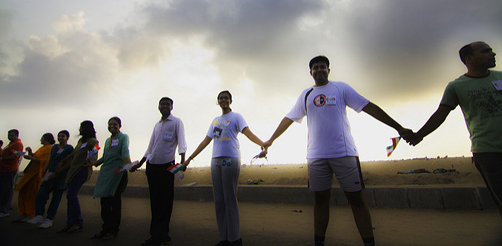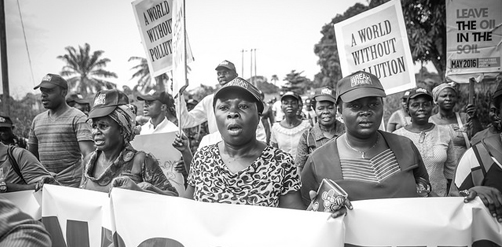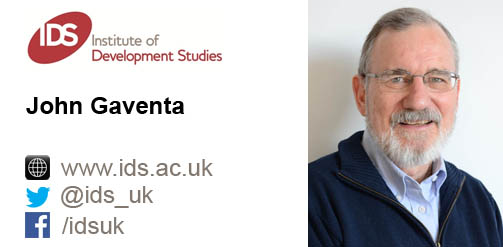These are exciting days in debates on the role of accountability – what it is, why it is important, how we achieve it. At IDS, we are seeing the conclusion one major international accountability-focused programme, Making All Voices Count, and the beginnings of another, Action for Empowerment and Accountability. But are we building on past debates or is this just a déjà-vu?
In the last few months, I’ve participated in three events which prompted me to reflect on how far the accountability debate has come over the last 20 years.
First, a meeting of over 70 activists and academics in Egypt where we were gathered to discuss how to counter sexual harassment, as part of the new IDS Action for Empowerment and Accountability programme.
Sexual harassment is a huge problem in Egypt, with over 90% of women having faced some form of it. But now a new a zero tolerance policy at Cairo University – the largest university in the region – is creating space for action, which is rapidly spreading to other higher education institutions.
At the meeting, feminist academics and campus-based groups joined youth-led movements, digitally savvy groups like Harassmap and NGOs experienced in social accountability like CARE to develop bold new strategies for holding these commitments to account.
In the same month, I joined some twenty IDS research colleagues for an exciting cross-Institute conversation about our work on accountability. In the past, this conversation would have primarily engaged those working at the intersection of governance and citizen participation. Now we found ourselves discussing applications in digital democracy, financial inclusion, health, nutrition, social protection, the SDGs and value chains.
This take up and spread of the accountability agenda was also prevalent at the third event, a workshop on Accountability for Health Equity which brought together some 80 researchers, policymakers, activists and others from around the world. Some have been working for years on accountability as a process for confronting power and politics while others were seeking to bring these tools and experiences to address issues of equity and delivery specifically in health systems, in a context of growing privatization, rise of transnational and non-state actors, and growing health inequalities.
A key theme was recognizing the importance of history and context in movements for accountability which resonated deeply with me, so please indulge me in four broad reflections from my own history of work in the field.
1. These debates are not new, but have come a long way
During the Accountability for Health Equity workshop, I thought back to a similar workshop on Health, Participation and Accountability which took place in the same space in 1999.
Discretely reading through a special issue of the IDS Bulletin from the workshop on my iphone (thanks to the now fully open access and mobile-friendly IDS Bulletin archive), I was struck by how analogous its themes were to what we were now discussing, even down to the questions posed by Andrea Cornwall and colleagues at the time: ‘accountability to whom, by whom and for what?’.
But there also was something different in the air.
While in 1999, there was a call for documentation and knowledge building of how participation could contribute to accountability in health, by 2017 participants (some of whom had been at the earlier meeting) now spoke from an enormous and rich base of empirical experience of initiatives in the field over the last two decades.
In 1999, the challenges was to go beyond local experiments; by 2017 the conversation was very much about linking to national and even international health systems. While in 1999, we thought we were on to something new, in 2017 we were reflecting upon and sharing on what felt like a much larger, maturing field of both practice and inquiry, with a more diverse array of actors.
2. Linking Voice and Accountability
In that period around the new millennium, following the hey-day of attention in the 90s in development on participation, new conversations were emerging about strengthening citizen voice on the one hand with the need for accountability of institutions on the other. But the idea of citizen-led accountability, that is voice ‘with teeth’ as Jonathan Fox now writes about, had yet to appear.
For instance, in 2001, Anne-Marie Goetz and I (with the help of a number of colleagues) published an IDS working paper entitled ‘Bringing Citizen voice and client focus into service delivery’, based on a review of dozens of emerging example of how citizens engaged with service providers.
At that time, our language was more about voice and responsiveness, not accountability.
When it was discussed, accountability referred to its political, fiscal, administrative and legal forms – not to what we would now call social accountability. But building on the pioneering work by Goetz and Jenkins on ‘hybrid accountability’ growing from the MKSS movement in India, as well as the dozens of other examples, we examined the emerging trend of direct citizen engagement in accountability initiatives and their potential to ‘break the state’s monopoly over responsibility for executive oversight’.

Accountability gave more institutional force to the somewhat weak ideas of mere ‘responsiveness’ as it implied some level of answerability and even enforceability.
Equally, the concept of citizenship which implied a set of rights that would give participation and voice more teeth, something we explored at length during the 10-year Development Research Centre on Citizenship, Participation and Accountability research programme from 2000 – 2010.
But still there was a gap – with work still divided between building the voices of citizens on the one hand, and accountability and responsiveness’ of institutions on the other.
By 2017, the language has moved on.
Binary ideas of voice and response, of demand and supply, of civil society vs state, have largely been replaced with the strong recognition of the need for cross-cutting accountability coalitions, which link actors ‘from above, from below, and from all sides’ as someone in the Health Equity workshop observed.
Social accountability, or accountability to society, has become widely part of the accountability lexicon, adding to the other forms which were challenged as inadequate fifteen years ago.
If anything, today, the pendulum has swung the other way, and at the Health Equity workshop there were reminders that strategies for social accountability cannot stand alone. They must complement – not replace – the political, fiscal, bureaucratic or legal forms of accountability which are still so important.
3. Accountability is a social and political process
In the early days, discussions often contrasted ‘accountancy’ as a relatively apolitical, technical process emerging from the fiscal and managerial domains, with ‘accountability’, seen as more of a social and political process, imbued with issues of interests, power and rights.
Today, the debates between the technical and the political continue but with a different twist.
Over the last 15 years, one could argue that the field of social accountability has given rise to its own form of ‘social accountancy’ – with a wide repertoire of digitally enhanced tools for citizen voice and engagement, where counting hits and retweets is as much as an art as counting numbers in budgets in fiscal accounting.
Yet as many pointed out, the techniques of social accountability do not in themselves deliver accountability, and indeed they are part of larger webs of conflicting interests and power relations, especially in the digital realm, with its rapidly emerging levels of corporate control.
Some lamented that, amidst the rise of social accountability for delivery of services, we seem to have lost the language of rights – including both uses of accountability strategies in struggles for a broad sets of social, political and economic rights, as well as the expectation of minimal levels of accountability by those in power as a right in and of itself.
4. Whither the private sector?
When we launched the Citizenship DRC, one important stream, led by Peter Newell and Joanna Wheeler, looked at rights and accountability in relationship to corporations and other private actors, building on strategies, concepts and discourses from the then vibrant literature on corporate accountability and responsibility.
We added to these debates exciting case studies on the struggles of garment workers in Bangladesh and for the Living Wage in the United States, collusion between mining companies and the government in the Niger Delta and India, and privatization of water in Mexico.

Currently, work on corporate accountability appears to be largely absent. Yet, given the current debates on health equity, it’s vital to be discussing accountability approaches which respond to the growing entry of corporate actors into public health and the growing marketization of local level health services.
In an era of increasing economic inequality and deregulation in a changing geo-political landscape, holding private actors to account, especially for delivery and stewardship of public goods and resources, is critical.
All the more reason to gain insights and learn from the earlier and, it seems, largely forgotten work on citizen-led struggles for corporate accountability.
While some of these questions in the accountability field have endured across the last eighteen years have endured, much has been learned.
New challenges are emerging as the field grows – of going to scale, grounding the numerous innovations in history, language and context, how to work in violent, fragile and conflict settings, and how to hold to actors to account in a post-truth world, where, as my colleague Anu Joshi points out, the first response is to ‘deny, distort, distract and dismay.’
While at moments in these conversations I had a sense of déjà vu of workshops gone past, on the whole I am re-energised at how far we the field had come, and the work that is yet to be done.
Images: Say no to Bribe – Kannan B (Flickr), Nigeria Break Free – Break Free (Flickr)

